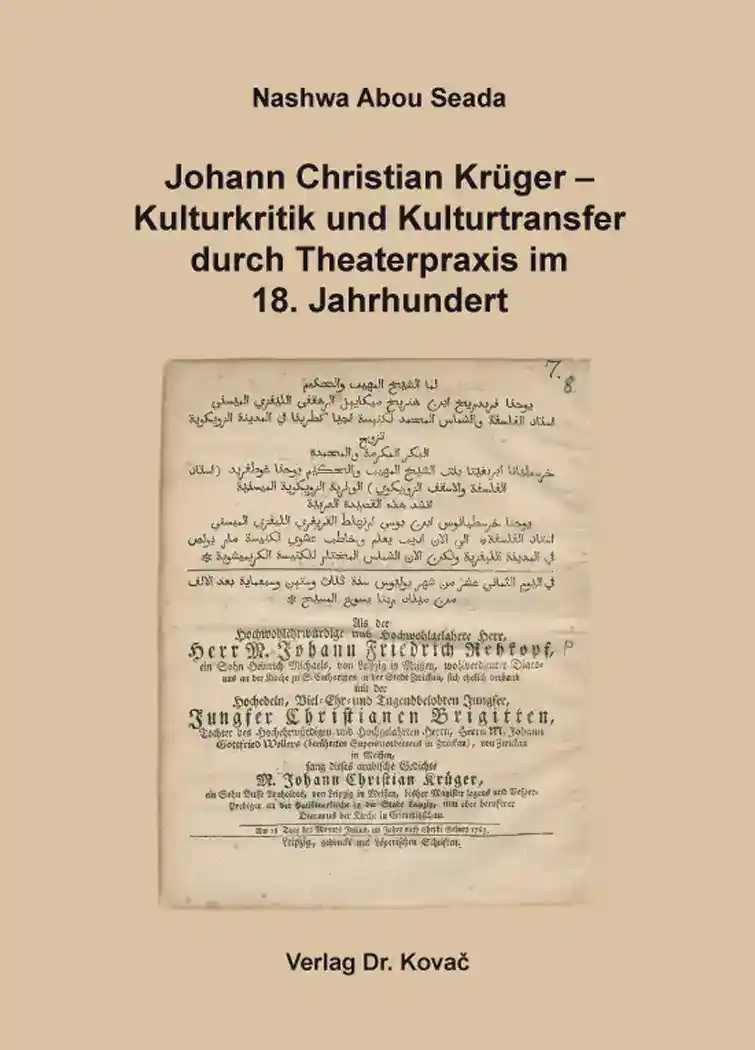Nashwa Abou SeadaJohann Christian Krüger – Kulturkritik und Kulturtransfer durch Theaterpraxis im 18. Jahrhundert
POETICA – Schriften zur Literaturwissenschaft, volume 137
Hamburg 2015, 386 pages
ISBN 978-3-8300-8292-7 (print) |ISBN 978-3-339-08292-3 (eBook)
About this book deutschenglish
The book has taken up the topic of Krüger’s meaning not only as an author but also as playwright – or rather theater reformer – and as a translator for German comedy before Lessing. It likewise investigates the social criticism in J.C. Krüger’s works, to what extent Krüger has contributed as a comedy writer to a form of nationalization of the German stage, which led to a reform of the Theater and stood as an example and pattern for German men of letters in the late 18th century, and next with the impact of his translations and transmission of French works on theater practices in German-speaking areas of the eighteenth-century, and finally with Krüger’s efforts aided by his new conceptions of comedy and theater practices to bring about a change in the theory of theater and the anthropological concepts of the eighteenth-century contained therein. The translations played an important role in this reciprocal context, especially in terms of the interlacing of cultures which was born primarily through multilingualism. From this investigation the conclusion was drawn that the phenomenon of multilingualism affected a series of novel points of reference especially through the spread of anthologies, and through translations and republications. Krüger’s translation activities were not only limited to these projects but he especially popularized translation strategies such as the application of dialects as a stylistic touch in his translations. In relation to Krüger’s theater reforms, the theater was meant to contribute to the formation of the individual, something which differentiates Krüger’s reforms significantly from Gottsched’s. While Gottsched only inquired into the rules, Krüger sought after diversity. What was important for Krüger, however, was not to lose one’s own national character within this diversity. Rather, one should learn through this diversity to model oneself, or better said, to profile oneself. This strategy was reconstructed within his texts whereby the connection between heterogeneous comedic forms went well beyond the praxis of his contemporaries. What was new with Krüger was thus the combining or rather the adapting of elements of the moving comedy in imitation of elements of the Saxon Type-Comedy, Commedia dell’arte and the Italian theater. The analysis of Krüger’s work has shown that Krüger’s texts are a case unto themselves. His texts go beyond all typical, traditional types and seem to strive to dissolve these in order to ultimately create a new type which breaks important ground toward Sturm und Drang. This hypothesis was the starting point of the reflection in order to prove whether Krüger really should be categorized as a new type of Enlightenment comedy or whether his comedies should be considered as an example of the dissolution of the typical Enlightenment comedy. The difficulty of sorting out the typology consisted mostly in its classification within the categories of the typical literature studies and especially the theory of genres and literary history. The primary requirement of the work was the analysis of Krüger’s dramas and poetic writings within the history of theater, and literary and intellectual history of his time and to emphasize the importance of the short-lived writer as a primary representative for German comedy in the eighteenth-century and through this dissertation to move him from the rank of unknowns to the rank of the major representatives of the period.Keywords
18. JahrhundertArabische LiteraturAufklärungAufklärungspoetikAuflösungserscheinungGottschedInterkulturalitätIntermedialitätJohann Christian KrügerKalila und DimnaKulturkritikKulturtransferLiteraturwissenschaftMoralkritikOrientPietismusTausend und eine Nacht.TheaterpraxisTheatertheorieÜbersetzungÜbersetzungstheorienVergleichende LiteraturwissenschaftIhr Werk im Verlag Dr. Kovač

Möchten Sie Ihre wissenschaftliche Arbeit publizieren? Erfahren Sie mehr über unsere günstigen Konditionen und unseren Service für Autorinnen und Autoren.
